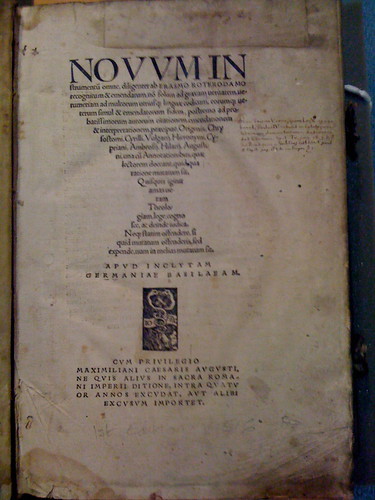I don’t remember where I left off in the “How To Do Exegesis” series, but this afternoon I’m provoked to write about a phenomenon that puzzles me as a scholar, frustrates me as a colleague, and depresses me as a teacher. This is the phenomenon of which I’m thinking: Sometimes a reputable scholar responds to reasoned challenges by noting some of the sources on which the challenge draws, and calling into question other points that these scholars make. That’s too abstract. What I mean is that sometimes Lester (let’s say) will cite points that Kirk, Hays, and Bulkeley, make relative to a critique of Adam. Lester may say, ‘Kirk has shown an alternative interpretation of Rom 3:1-8, which makes the grounds for Adam’s assertion that “Paul understands the Old Testament as a collection of oracles such as a chresmologos would consult” conflicts with Hays’s and Bulkeley’s treatments of prophetic oracles’. OK so far? Lester thinks I’m wrong, and he draws on Kirk, Hays, and Bulkeley to make his point.
This is where the irritating part comes in. In this hypothetical case, Adam sometimes responds, ‘Of course, Kirk reads Romans as apologetic literature, a long-discredited analysis. As such, he would be attracted to such counterintuitive proposals as Hays’s misreading of Isaiah, and Bulkeley’s postmodern skewering of Amos. Lester here is simply barking up the wrong tree’.
Do you see what I just did? Nothing in the whole response addresses the substance of Kirk’s claim, or Hays’s, or Bulkeley’s. When Lester identifies Kirk’s treatment of Rom 3:1-8, he calls me to respond to that issue, not whether I think Kirk is right about Romans as apologetic. Kirk may be 100% correct about Rom 3:1-8 even if Romans is better read as epideictic, or ambassadorial, or a thank-you note to his auntie. Neither does my riposte above rebut Kirk’s reference to Hays or Bulkeley; characterising these scholars doesn’t amount to demonstrating that their arguments don’t hold water.
When we aspire to critical interpretation, we volunteer to meet the standard of the best plausible explanation. The best plausible explanation may not be the one we like the most, or the one that our denominational authorities insist is correct, or that comforts us on our sickbed, or that supports arguments that we espouse for other reasons. There’s noting intrinsically wrong with preference, denominational loyalty, consolation, or our other convictions. They just don’t warrant our critical exegetical arguments.
So we may opt to stick with our favourite reading of Romans 3:1-8, even though we know that Stack-Nelson has made a convincing argument that leads to a different conclusion. That’s OK, it’s a preference, not a reasoned, critical conclusion. We may be loyal, obedient representatives of our Calvo-pisco-ptist Evangelische Humanist Association (or whatever), so long as we don’t try to represent our fidelity to CEHA doctrine as critical interpretation of Romans 3:1-8. We may pray ‘Let God be true, though everyone else a liar’ while tossing and turning in bed with a feverish flu (why one would do so is a separate question). We may think of circumcision as a form of child abuse, even if we agree that Romans 3:1f insists that circumcision is very beneficial in every way. All OK, so long as one distinguishes what one thinks on other grounds from what one affirms as a critical reader.
But if, in the give-and-take of critical discussion, Lester cites Stack-Nelson’s interpretation of Rom 3:1-8 as evidence against my argument, it’s my obligation to address that claim one of several ways. I may show the reasons that I find Stack-Nelson’s claim unconvincing. Or I may allow that she has propounded a convincing interpretation, but that it doesn’t necessarily undermine my own. Or I may give a reason that her argument doesn’t count as evidence (perhaps she made it in the context of a discussion of the relative merits of punk rock bands, rather than Greek-language analysis of Pauline epistles).
If instead of addressing Stack-Nelson’s claim against me, I slough it off by disputing a different aspect of her argument, or by questioning her judgment in general, or by suggesting interpretive guilt by negative association (‘she’s a heretic’, ‘she’s a fundamentalist’), by throwing out a red herring (‘She obviously hasn’t read Carey’s recent monograph’ without explaining how Carey’s monograph affects Stack-Nelson’s proposal), by appealing to my reputation (‘How many keynotes has she given? How many books has she written?’), or by ignoring her, I’m no longer speaking with the authority of critical scholarship. Anyone can dodge a question; meeting a challenge, allowing its full force, and explaining your position relative to that challenge, that’s what a critical scholar is called to do.
So, sometimes ‘criticism’ isn’t critical, in the sense that we don’t really need critical exegesis for the need at hand (when I’m lying a bed with the flu, I want someone to make me feel better, not to parse Greek participles) (though now that I mention it, participles are a lot of fun, and might make a diverting relief from neuralgia and overheating). And sometimes criticism isn’t ‘critical’ in the sense that the arguments from ostensibly responsible scholars neglect actually to address the issue in question honestly and analytically.
Our jobs in conducting exegetical research require us to put forward what seems the best explanation of the evidence before us, to give reasons that this proposal better fits the evidence than does our neighbour’s, to join up as strong as case as we can think up, and to be aware that sensible interlocutors will still have good reasons to reach other conclusions. We may not enjoy admitting that Judy Stack-Nelson has a very strong case for her opposing theory, or that Tim Bulkeley’s recondite postmodernism actually does laudable work with the Hebrew text, or that we just never remember which Iron Age level Chris Hays’s reconstruction of Isaiah belongs to (or even whether it was Bronze Age or Some Other Metal Age), or that Brooke Lester remembered aspects of ancient oracle-mongering that we hadn’t taken into account, or that Daniel Kirk’s broader exposition of Romans makes his particular reading of 3:1-8 more likely than ours (which doesn’t fit tidily into any overall reading of the epistle).
(This goes with my series on ‘How To Do Exegesis’, which may turn into a book someday, but which aims to spell out some of the aspects of interpretive labour that my colleagues sometimes think of as self-evident. The first post is here, second here, third here, fourth here, fifth here, sixth here, a relevant but non-serial post here, and some miscellaneous notes and quotations elsewhere in the ‘How To’ category. If you want to use some of these for your teaching, by all means help yourself, unless you charge for them or take credit for having prepared them. I did not consult the actual scholarly positions of any of the friends I invoke here; they’re all smart, wise, critical, profound, and correct, except when they depart from what I think.)
 It’s become commonplace for biblical critics to concede readily that no one is truly objective — “but” (they say) “we must strive to be as objective as we can.” In the shower this morning I was wondering what this means. On one hand, if objectivity is impossible, striving for it amounts to an empty gesture. I may strive for universal acclaim, but I know that haters gonn’ hate, and “being applauded by a great many people” differs in significant ways from “universal acclaim.” How could one more precisely get at what people hope for when they say “we must strive to be as objective as we can”?
It’s become commonplace for biblical critics to concede readily that no one is truly objective — “but” (they say) “we must strive to be as objective as we can.” In the shower this morning I was wondering what this means. On one hand, if objectivity is impossible, striving for it amounts to an empty gesture. I may strive for universal acclaim, but I know that haters gonn’ hate, and “being applauded by a great many people” differs in significant ways from “universal acclaim.” How could one more precisely get at what people hope for when they say “we must strive to be as objective as we can”?
